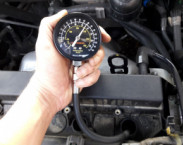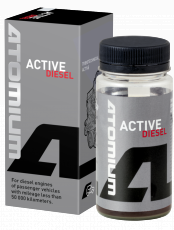In this article, we are going to discuss the compression of a diesel engine, how it works, the effects it has on the fuel economy and power of your vehicle, and what steps you can take to preserve the compression and restore it.
To start with the topic, you must understand that compression is the power of the engine in simpler words. The more compression an engine can achieve without losing it due to any cause, the better performance you will have for your vehicle overall in all the aspects.
What is Compression?
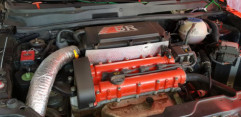 Every combustion engine runs on a combustible fuel, and so does the diesel engine. The concept is rather scientific and complex but requires precision. In a combustion engine, either diesel or petrol, a mixture of air and fuel is confined and pressed inside the vehicle cylinder. The mixture gets compressed inside the pistons before combustion to get the maximum output from it.
Every combustion engine runs on a combustible fuel, and so does the diesel engine. The concept is rather scientific and complex but requires precision. In a combustion engine, either diesel or petrol, a mixture of air and fuel is confined and pressed inside the vehicle cylinder. The mixture gets compressed inside the pistons before combustion to get the maximum output from it.
While petrol is a bit leaner fuel, diesel, on the other hand, is quite rich. Diesel requires and can take high compression to work efficiently and hence generates way more power for your vehicle than a petrol engine. That is the sole reason that diesel engines are considered more reliable and powerful than a regular petrol engine. To understand the difference between these both, here is a fair comparison.
Petrol Engine Vs. Diesel Engine Power Comparison
A petrol engine usually runs around 9:1 to 11:1 for most cars and cannot go higher than that without causing any damage or burning.
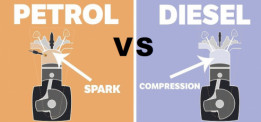 Under these conditions, the higher compression ration you can achieve on a combustible engine, the more power you will get.
Under these conditions, the higher compression ration you can achieve on a combustible engine, the more power you will get.
But the problem is that a higher compression ratio means higher temperatures inside the engine cylinders, and they can sometimes cause overheating, loss of power, and other issues in a petrol engine if you try going above that compression ratios.
The diesel engine, on the other hand, is whole another story. Diesel engines can easily achieve compression ratios ranging from 15:1 to 23:1 without getting overheated. Diesel can be compressed to such extreme pressure before the combustion process, and that achieves a higher power for your engine than you can get out of a petrol engine. That is why the diesel engine’s components are made not only to endure such extreme pressure but high temperatures as well.
Why is Low Compression Dangerous?
Besides the fact that a low compression can cause your performance to decrease drastically, it is different for your engine in many ways. First and foremost, the thing to be worried about is that your engine is not performing at its optimal capacity that will result in poor performance and increased fuel consumption from the vehicle.
Moving forward, you will start feeling jerks in your car, sometimes it will lose power all of a sudden while driving, and that can cause you some severe accident too. A diesel engine is all about power, and loss of power on a diesel engine is not a good sign. These jerks will be caused due to loss of compression as the cylinders might be leaking out the gases being compressed in them.
Low compression can also increase the wear and tear on your engine cylinders that will decrease the life of your engine along with the performance. You will be facing several issues such as car heat up, an obvious increase in your fuel consumption, and ultimately your car will break down. Several issues that you can face if your diesel engine is giving out low compression are:
Diesel Engine Losing Power

Your diesel engine will drastically lose power. You will see an obvious decrease in acceleration and a top speed of your vehicle, and this is an early sign of your engine running on low compression. You will also start facing knocking and jerking issues in your vehicle that will affect y our driving experience, and you should consider taking steps if you are at this point.
Diesel Engine Loss of Power Under Load
You might not feel any difference while driving on a normal day to work with lower rev and acceleration, but once you hit the accelerator, your engine will seem to lose its power on the higher revs, and this should ring the bell for you that there is a check-up due for compression of your engine.
Increased consumption of fuel
If your diesel engine is losing compression at some point, you will not only lose power on it but, you will also start to see a noticeable change in your fuel mileage. Your vehicle’s fuel consumption will be increased by a significant margin, and that is something that you want to have on your daily drive or a road trip.
What Causes Compression Loss?
Some major aspects that play a key role in an engine to lose its compression are:
Low-Quality Fuel
One of the main reasons that cause an engine to lose compression is low-quality fuel. A fuel that is of substandard quality or one that contains any sort of impurities can cause you to have some real troubles. Due to the fuel not being right, you can face issues like it burns up before it should and causes excessive heat inside your engine cylinders that can cause damage to the insides of your cylinders. Fuel contamination can lead to bad fuel injectors, ultimately resulting in low or poor compression on your diesel engine.
Wrong engine oil grade
 Engine oil is the savior of your engine components. It not only reduces friction between the moving components inside your engine, but it also decapitates any excessive heat that is being produced inside your engine. That is why you should always use OEM recommended engine oil inside your vehicles.
Engine oil is the savior of your engine components. It not only reduces friction between the moving components inside your engine, but it also decapitates any excessive heat that is being produced inside your engine. That is why you should always use OEM recommended engine oil inside your vehicles.
Using a wrong grade of engine oil, or substandard quality can make your engine lose the compression as there will be excessive heat and friction inside your engine that will trigger performance issues. Be mindful that you need to increase the density of engine oil you are using after your vehicle has run a specific mileage to ensure that you are getting the best lubricant for your engine according to the condition it is in.
Faulty Oxygen Sensors
Sometimes, the problem can be as simple as a faulty oxygen sensor that is not able to detect the right amount of air that is required by your engine to compress the fuel. There are tons of electrical components included in the system, and this can be one of the major reasons for you to lose compression, in addition to some other components such as a clogged air filter.
Damaged Coils
Electrical components and Sensors like air sensors, oxygen sensors, and electrical coils all are important to maintaining an optimal compression inside an engine. Coils convert the electrical current from the alternator that is 12 volts to 2000 volts to ignite the fuel and burn it more efficiently. If one or more of your coils are damaged or not working properly, you will face issues with compression of your engine.
Worn out Cylinders

The worst causes of these all are worn out cylinders of your engine. If your cylinders are in the early stages of getting the damages, there are certain things that you can do to prevent the damage to increase. But if they have gone beyond the stage of repairs, you will end up having to replace those cylinders or worst, changing your whole engine. Worn out cylinders can cost you lots in terms of repairs, so you need to ensure that you are preventing your vehicle, especially a diesel engine to lose compression.
What Can You Do to Prevent Compression Loss on Your Diesel Engine or To Restore It?
You must wonder if this is such a big problem, what preventive measures you can take to prevent compression loss on your engine, and if it is possible to restore it somehow? Well, both are possible in due time unless your engine and cylinders are gone bad beyond repairs. Some preventive measures would be:
To Prevent compression loss
There are a few steps that you can take to ensure that your diesel engine is not losing compression when hot or not having power losses at all, such as.
Regular Maintenance
Regular maintenance is the key to having the best possible performance and longevity for your engine. You need to ensure that you are getting your vehicle checked-up at regular intervals for any issues. The smallest of the issue can build-up some serious problems for you that you don't want to have. That is why dealerships recommend you pay them a visit frequently so your vehicle can be diagnosed properly, and the issues can be fixed before they start messing up something else.
Change engine oil regularly
You need to ensure that you are changing your engine oil at regular intervals as well. The oil can lose its power to lube the components efficiently over time and with running for a certain mileage. This interval will depend on your engine oil and the grade you are using. You will need to consult the manufacturer for your engine oil or your dealership for the interval of your engine oil running and follow it religiously.
Always Use Synthetic Engine Oil
It is most important for Diesel Engines of all the vehicles to use Synthetic Engine Oils. Synthetic Engine oils are prepared keeping the performance aspect in consideration, and they are the best you can get for any engine, specifically a diesel one. With the right number of additives and no contaminations at all, Synthetic Engine Oils don’t leave any excessive debris or residue inside your diesel engine. Additionally, they don’t have any elements found in the natural engine oils that might decrease the lifespan of your diesel engine.
How Can You Restore the Loss of Compression on Your Engine?
Now, if you are already having compression issues, they can be due to two different reasons. One might be due to the temperature issues, or some electrical issues, and they can be easily solved using those better electrical components.
Diesel engine losing Power when hot
If your diesel engine is losing compression when hot and is working fine otherwise, you need to ensure that you are changing the engine oil at the right intervals, there is no leakage in the oil pan, and your engine oil is in the right quantity. You can also try changing the engine oil grade and move to an oil with a higher density to ensure that there are no issues of losing compression on your engine if it is hot.
However, if you want to enhance the compression of your engine and run it at optimal power at all times, there are some cool solutions that you can use.
ATOMIUM ACTIVE DIESEL
Motor oil additive for restoring engine performance characteristics: compression, power, acceleration, effective fuel consumption, as well as for extending the wear life and protection in emergency situations.
If your diesel engine has run less than 50,000 Km and you are feeling that it is not performing like it used to, or you just want to have the performance restored like a brand-new engine. This is the perfect product for you to have. Atomium Active Diesel is the best engine oil additive that you can get for enhancing your car compression, power, avoid oil burning, and reducing fuel consumption. It preserves the diesel engines, keeping compression at an optimal level.
It will not only perform wondrously to improve the overall car performance but will also get you better compression on your diesel engine. It is suitable for all engine types and designs, especially cars, including turbocharged and non-turbocharged engines, so you will never have a problem with any sort of engine that you might have.
Atomium Active Diesel Plus
Atomium Active Diesel plus is the enhanced version for Atomium Active Diesel, focused on restoring the engine compression and performance, suitable for any sort of diesel engine. It can be added to any vehicle that is running a diesel engine or even your generators. The additive restores the performance for your diesel engines, and if your vehicle has clocked more than 50,000 km of mileage, this is a must-have product. This will eliminate your Diesel Engine Losing power on acceleration.
How to Use?
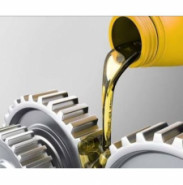
You must be wondering how to use such a product in your engine, and the process is very simple that you can do at your home as well. The best thing to do is run your car until the engine reaches its optimal temperature. This will mix up all the engine oil properly and lubricate all the components efficiently.
Now, pour 1 bottle of Atomium Active Diesel or Active Diesel Plus in the engine. 1 bottle should be enough for engines that have up to 7 liters of engine oil capacity. Anything above that would require you to add at least two bottles.
Once you have poured the compound into your engine, you need to run it for around 20-25 minutes so it can mix up with the engine oil and distribute evenly through your engine. After that, you can use your vehicle as you normally would and enjoy a better, fast, and powerful experience with your vehicle.
How Can Atomium Active Diesel help?
There are two types of situations that you might be facing, and Atomium Active Diesel and Active Diesel Plus can help you with it. Both of these would require different applications that are:
Enhancing Engine Performance and Compression
If you want to preserve your engine compression or enhance it For that purpose, you can use 1 or 2 cans depending on your engine oil quantity, as stated above, at every 1000km of mileage. This will ensure that your engine oil always has the right amount of additive that is required for it to run optimally.
Preserving your compression and engine
Even if your engine is running fine and there are no compression issues on it at all. You can still use the product to increase the life and compression of your engine. This will also ensure that you are having the best performance along with the preservation of your engine cylinders, saving it from any wear and tears that can develop over time.
How does it work?
Atomium Active Diesel is an engine oil additive that is added to the engine oil. The best part is that it does not affect any properties, longevity, or efficiency of the engine oil in any way. It does not react with the engine oil at all, so you can rest assured that you won't be facing any issues. It simply helps you preserve or restore your engine performance in the most effective and cost-efficient way.
Atomium Active Diesel and plus are both certified by most authentication bodies for their efficiency and are recommended by the dealerships for your diesel engines so they can have compression and better overall performance in every aspect. With these products, you will have less wear and tear on your cylinders that will ultimately result in increasing your engine life, enhanced compression output, and performance under all circumstances.
Top Benefits
The benefits that you are going to achieve with these additives are too good to resists. Both these products are easy to use, and a better solution that you can get. Both these are the right treat for your vehicle to get it going with preserved and enhanced compression. Some top benefits that you will have upon using these products on your
Diesel engines are:
- Fuel Consumption: Your fuel consumption will be decreased significantly, and you will end up saving more in terms of fuel than you would spend on Atomium Active Diesel.
- Enhanced Performance: The performance and power of your engine will increase significantly, ultimately increasing and enhancing your driving experience.
- Better Compression: You will get better compression on your engine, and you will never feel your engine going underpowered.
- Longevity for Engine: To top it all, your engine life will be increased considerably, which would ensure enhanced performance and longer life span for your diesel engine.
So, these products are a must-have for you whether you are looking to enhance your diesel engines’ compression and power or looking to restore it for your engine.

